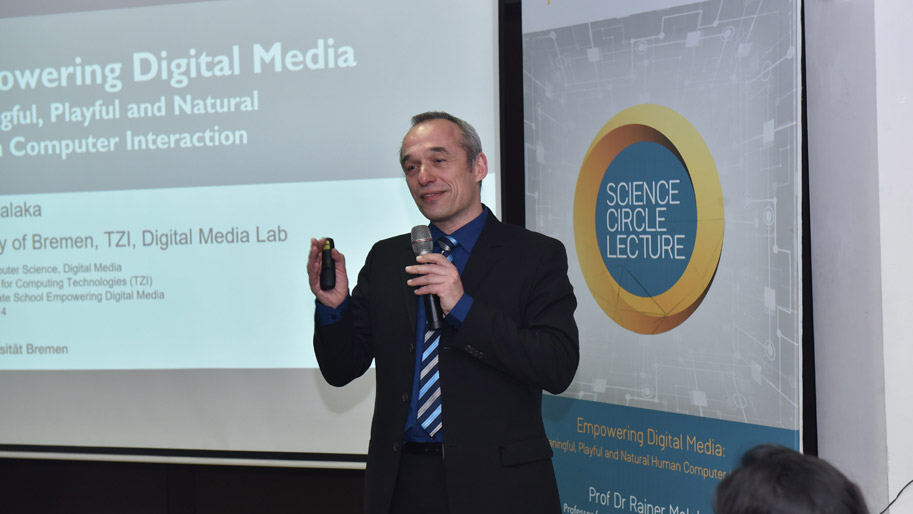Science Circle Lecture "Empowering Digital Media: Meaningful, Playful and Natural Human Computer Interaction (HCI)" by Prof Dr Rainer Malaka
 © DWIH New Delhi
© DWIH New Delhi
Adding to the list of successful and interesting Science Circle Lectures (SCL), the German House for Research and Innovation (DWIH, New Delhi) organised its second SCL of the year on 16th February 2018 at the German House. Supported by the German Embassy and the University of Bremen, this event revolved around an engaging lecture by Prof Dr Rainer Malaka on the topic of “Empowering Digital Media: Meaningful, Playful and Natural Human Computer Interaction (HCI).”
Presented by Science and Technology Head, German Embassy – Mr Stephan Lanzinger, the event commenced with a welcome address that reinstated the legacy of Germany as a great innovator. Further advocating this, Mr Lanzinger also confirmed the news of Germany’s interest in increasing its spend on R&D from 3 to 3.5% thereby maintaining its position as a global leader in research and development.
Following the welcome address by Mr Lanzinger and a brief introduction by DWIH Director Heike Mock, Prof Malaka’s lecture threw light on the concept of digital media – more appropriately understood as computer assistance systems that bridge the gap to the digital world. Moreover, these are also known to change the way humans work and interact and imparts super-human capabilities. However, according to Dr Malaka, digital media should empower humans as citizens of the digital world and not just be designed to sell products.
Defining the four stages of evolution in the field of HCI i.e. from Ergonomics to Utilitarianism to Hedonism and finally Eudemonia, Dr Malaka stressed on the point of HCI supporting human life in a sustainable manner more specifically in a meaningful, playful and natural way in today’s day and time. This further involves computer engineers designing meaningful HCI which considers human errors and doesn’t take competencies away from them thus having an ideal system of intelligence amplification with smart technology, smart humans and smart interaction.
Additionally, the factor of playfulness with HCI comes out from more meaningful games such as those that drive digital societies and offer data that feed other important purposes. Whereas the feature of being natural defines HCI’s role in supporting age old art forms such as puppetry and sculpting with 3D interaction, animation and pre- visualisation of creativity.
Hence, realising the role of media in shaping digital society and the necessary shift of focus to HCI, Prof Malaka concluded the event by highlighting the three important aspects of HCI i.e. being meaningful to support a conscious mind, increasingly playful to motivate and natural enough to be embodied into other existing processes.
Date: Friday, February 16, 2018
Venue: German House
